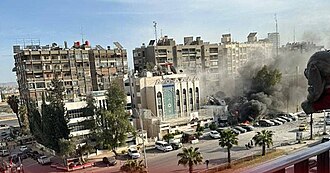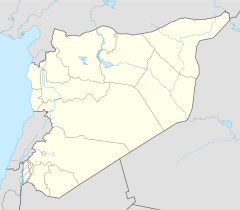On 1 April 2024, Israel conducted an airstrike on the Iranian embassy complex in Damascus, Syria, destroying the building housing its consular section. Sixteen people were killed in the strike, including eight officers of the Islamic Revolutionary Guard Corps (IRGC) and two Syrian civilians. The airstrike took place during a period of heightened tension between Israel and Iran, and amidst the Israel–Hamas war and the Israel–Hezbollah conflict.
| Israeli bombing of the Iranian embassy in Damascus | |
|---|---|
| Part of 2024 Iran–Israel conflict, Israel–Hamas war, Iran–Israel conflict during the Syrian civil war, Israel–Hezbollah conflict and the Iran–Israel proxy conflict | |
 Burning rubble of the Iranian consular building after the airstrike, with the Iranian embassy building standing on its left | |
| Location | 33°30′14.0″N 36°15′37.6″E / 33.503889°N 36.260444°E |
| Target | Iran's Damascus consulate building |
| Date | 1 April 2024 c. 17:00 (UTC+3) |
| Executed by | |
| Outcome | Building destroyed, targeted people and civilians killed |
| Casualties | 16 killed
|
Numerous countries and international organizations condemned the attack. On 13 April 2024, Iran retaliated against the attack with missile and drone strikes in Israel, stating that it was primarily targeting the military bases from which Israel had launched the attack.
Background
Since 2013 Iran has maintained a presence of its troops in Syria in response to the Syrian civil war, as Syria is a crucial ally of Iran. Additionally, it has been involved in training and funding paramilitary forces from Hezbollah, along with foreign militias from Iraq and Afghanistan, not only in Syria but also in neighboring Lebanon. Since the outbreak of the Syrian civil war in 2011, Israel has conducted hundreds of airstrikes targeting Hezbollah assets within the country.
With the onset of the Israel–Hamas war in October 2023, Israel has increased the intensity of its attacks on Syria. From 12 to 22 October 2023, Israel launched at least three attacks on airports in Syria, particularly on Damascus and Aleppo. Notably, Israel carried out the assassination of Razi Mousavi, a senior Iranian general, in the Syrian capital of Damascus on 25 December 2023, and Brigadier General Sadegh Omidzadeh, an intelligence officer with the IRGC Quds Force, on 20 January 2024.
Attack
According to Iranian, Syrian, and regional officials, on 1 April 2024, Iranian military commanders convened a "top-level meeting" inside Iran's embassy complex in Damascus in the belief that they were protected by "international norms shielding diplomatic missions". An Iranian source said that these commanders, which included General Mohammad Reza Zahedi who, according to Iranian officials, was in charge of Iran's covert operation in Syria and Lebanon, were in Damascus to discuss "operational logistics and coordination". According to Iranian officials, they were meeting with members from Palestinian Islamic Jihad, a militant group active in the Gaza Strip.
That day, the Iranian consulate annex building in the Iranian embassy complex in Damascus was destroyed by an Israeli airstrike. Iranian ambassador Hossein Akbari alleged that the consulate building "was targeted with six missiles from Israeli F-35 warplanes". The Guardian stated that Israeli warplanes were responsible for the attack. The New York Times (NYT) stated that four Israeli officials anonymously confirmed Israeli responsibility for the attack. Various other media outlets did not definitively attribute the attack to Israel, and the Israeli government refused to comment on the matter.
The suspected primary target of the attack was the Quds Force commander of the IRGC, Brigadier General Mohammad Reza Zahedi, who was killed in the attack. According to The Guardian, Zahedi was a critical figure in the relationship between Iran and Hezbollah. NYT reported that an anonymous source from the Revolutionary Guards said that the strike targeted a meeting between Iranian intelligence officials and Palestinian militants, including leaders of Palestinian Islamic Jihad, who were discussing the war in Gaza.
Footage and photos from the consulate area after the attack showed extensive damage, fire, and smoke. Iranian media reported that the building had been completely destroyed and that the ambassador and his family, who were housed in the embassy next door, were unharmed.
The unused Canadian embassy building on the other side of the consular building was also damaged in the attack, with at least some of its windows destroyed. It has been closed since 2012 because of the Syrian civil war, but it is still owned by the Canadian government.
Casualties
Sixteen were killed in total, including seven Islamic Revolutionary Guard Corps (IRGC) soldiers, five Iran-backed militiamen, one Hezbollah fighter, one Iranian advisor, and two civilians.
In addition to Zahedi, casualties included Zahedi's deputy Brigadier General Mohammad Hadi Haji Rahimi and five Iranian officials: Hossein Aman Elahi, Sayid Mehdi Jalalati, Ali Agha Babaei, Sayid Ali Salehi Roozbahani, and Mohsen Sedaghat. Zahedi was the most senior IRGC officer to be killed since the assassination of Qasem Soleimani by the U.S. in January 2020. According to Bloomberg the IRGC command wing in Syria was eliminated in the strike.
Analysis
Journalists Peter Beaumont and Emma Graham-Harrison of The Guardian wrote that the Israeli strike was a miscalculation that had "bulldozed through every red line to attack a location that Tehran maintains was tantamount to attacking Iranian soil."
Sanam Vakil, the director of the Middle East and North Africa programme at the Chatham House think tank, stated that the Damascus attack and the "breach" of the Vienna convention was "the straw that broke the camel's back."
Legality
Diplomatic premises, like homes and schools, are considered "civilian objects" under international law.
Diplomatic buildings are entitled to further protections from attack or other interference by the host country under international customary law, codified in the 1961 Vienna Convention on Diplomatic Relations and the 1963 Convention on Consular Relations. However, the responsibilities under the Convention only apply to the host country, in this case Syria, with the Convention saying nothing about attacks by third states in foreign countries.
A UN-commissioned panel of experts on international law consisting of Ben Saul, Morris Tidball-Binz, Javaid Rehman, Livingstone Sewanyana, and Cecilia M. Bailliet wrote that Israel had provided no legal justification for the attack, and had failed to report it to the United Nations Security Council. Therefore, in their view, it violated Article 2(4) banning recourse to force against another state. They also issued a warning that the Israeli officials involved in the strike might have committed crimes. The subsequent Iranian retaliation was also, in their view, prohibited under international law, since self-defense is only justified to deter continuing armed attacks, and the strike on the Iranian Embassy had ended 12 days earlier.
Aurel Sari, a professor of international law at Exeter University, argued that as a third state, Israel "is not bound by the law of diplomatic relations with regard to Iran's Embassy in Syria," however "unless Israel was able to justify the airstrike as an act of self-defense" it would be in violation of Article 2(4) of the United Nations Charter. Whether self-defense can justify an attack on the territory of a third country is a subject of academic debate.
Reactions
International
Official entities from many countries condemned the attack and considered it a violation of the international laws, including the Prime Minister of Iraq, the Prime Minister of Spain, the President of Nicaragua, and the foreign ministries of Afghanistan, Algeria, Armenia, Brazil, Belarus, China, Cuba, Egypt, Indonesia, Jordan,[citation needed] Italy, Kazakhstan, Kuwait, Lebanon, Libya, Malaysia, Maldives, Mauritania, Norway, Oman, Pakistan, Qatar, Russia (which called it a "political killing"), Saudi Arabia, South Africa, Sierra Leone, Tajikistan, Tunisia, Turkey, United Arab Emirates, Uzbekistan, Venezuela, Vietnam, as well as the Spokesperson for Yemen's Ansar Allah.[citation needed] The Foreign Ministry of Kyrgyzstan expressed concern.
The spokesperson for the UN Secretary-General condemned the attack.
Russia requested the UN Security Council to discuss the strike. A statement condemning the attack was drafted by Russia to be issued by the Security Council, but the Western member states opposed the issuance of any statement. During the briefing in the United Nations Security Council, the representatives of many countries (such as Ecuador, Guyana, Slovenia, South Korea, and Switzerland) noted that any attack on diplomatic and consular premises violates the Charter of the United Nations as well as the 1961 Vienna Convention on Diplomatic Relations and the 1963 Vienna Convention on Consular Relations. They also expressed concern that the incident could further escalate the regional conflict. The representative of Japan only expressed concern, and the representative of the United Kingdom noted the importance of "respect ... for diplomatic premises", but also criticized Iran. The spokesman of the United States National Security Council only stated that the US was not involved and had no prior knowledge of the attack. Israel had notified the US in advance that it would be operating in Syria, but did not identify the target. The Representative of Russia criticized the statements made by the US and others including France, considering them to be double standard.
United States officials said Israel had notified the US in advance that it would be operating in Syria, but did not identify the target. A Pentagon spokesperson said Israel had provided no advance warning of the strike.
The Arab League, the European Union, the Gulf Cooperation Council (GCC), the Organisation of Islamic Cooperation (OIC), as well as the Shanghai Cooperation Organisation (SCO) also condemned the attack.
Israel
The Israeli military spokesman claimed that the building is neither a consulate nor an embassy, but a military building of Quds forces "disguised as a civilian structure in Damascus". Israel told the U.S. that if a retaliatory attack by Iran would prompt a robust response from Israel.
Seven Israeli embassies were evacuated in response to the potential threat of an Iranian retaliatory attack, after Iran publicly blamed Israel and vowed retaliation. The IDF deployed GPS jamming systems within Tel Aviv to safeguard against potential aerial attacks by Iran. Initial U.S. intelligence anticipated a significant attack on U.S. or Israeli assets as soon as the week of 8–12 April.
Iran
In several cities across Iran, including the capital, Tehran, as well as Tabriz and Isfahan, large crowds of protesters gathered waving Palestinian and Iranian flags and demanding revenge. The Iranian Supreme Leader Ali Khamenei vowed a harsh response to the attack. Khamenei's political advisor Ali Shamkhani, said that the United States remains directly responsible. Iran also sent a letter to the United Nations Security Council, saying it "reserves its legitimate and inherent right to respond decisively". Syria's Foreign Minister condemned the attack, calling it a terrorist attack.
On 5 April 2024, Iran told the United States to "step aside" as it prepared for retaliation against Israel. On 13 April 2024, the IRGC Navy boarded the Portuguese container ship MSC Aries in the Strait of Hormuz via helicopter. It was redirected to Iranian territory. The MSC Aries is partially owned by Israeli businessman Eyal Ofer and operated by his company, Zodiac Maritime.
Later, on 13 April 2024, the Iranian military launched an air attack, firing more than 300 standoff weapons at Israel, including at least 170 aerial drones, 30 cruise missiles, and 120 ballistic missiles. The attack, which constituted the largest single drone attack in history, was described as a success by Iran and as a failure by Israel, the latter saying that its air defenses, buttressed by those of allies, destroyed almost all the incoming weapons before they could reach their targets.
See also
- 1992 Buenos Aires Israeli embassy bombing, Iranian government and Hezbollah found responsible by Argentine court
- 1994 AMIA bombing in Buenos Aires (85 dead), part of Iran–Israel proxy conflict
- 2020 Assassination of Qasem Soleimani by the USA
